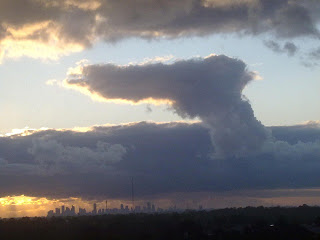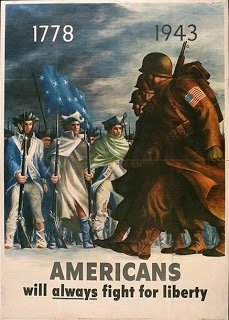Shadow of the Gun
By Daniel Greenfield
SultanKnish.Blogspot.com
Every day another one of the stories comes in. A
teacher panicked by a plastic gun, an army man on a
cupcake, a t-shirt, a pop tart chewed into the shape
of a gun or a finger gun hits the panic button.
Supensions and lectures quickly follow as the latest
threat to the gun-free zone, usually in the form of
a little boy, is tackled to the ground and lectured
to within an inch of his life.
Tellingly these incidents rarely take place in
the inner city schools where teenage gang members
walk through metal detectors at the start of the
day. The safety officers in those schools, big weary
men with eyes that look everywhere at once, don’t
waste their time on toys. Not unless those toys are
full-size, painted black and filed down to look like
real guns.
It’s usually the schools where a shooting is wholly
unlikely; where gun violence is not a daily reality,
but an unlikely convergence of horror, that
institutional vigilance hits an irrational peak as
every school imagines that it could be the next
Columbine or the next Sandy Hook.
The NRA’s initial proposal of armed school guards
was met with an irrational chorus of protests. More
guns aren’t the answer, was the cry. And the leading
crier was the White House’s expert skeet shooter. In
a country where law enforcement is heavily armed and
gunmen are stopped by gunmen in uniforms, a strange
Swedenization had set in. The problem was not the
man, it was the gun. Get rid of the guns and you
stop the killing. Schools across the country are
banning not the gun, but the idea of the gun. It is
a conceptual prohibition that is meant to push away
the threat of gun violence by eliminating any
mention of the G word. Gun-free zones mean places
where guns cannot be mentioned, depicted or even
symbolized as if the refusal to concede the
existence of a firearm will eliminate the threat of
it being used on the premises.
This isn’t a precautionary attitude, but a pacifist
one. Gun horror is not a productive emotion, but
learned helplessness disguised as moral superiority.
Rather than teaching children to hate killers,
schools are instead teaching them to hate guns. And
reducing murders to instruments rather than morals,
children are left with no sense of right and wrong,
only an instinctive horror of violence.
Pacifists have always demonized armies rather than
invaders. During WWI they obsessed over gas. During
WW2, it was the bomber and the tank. During the Cold
War they demonized nuclear weapons. In the War on
Terror, they target the drone. By dealing with the
object rather than the subject, they are able to
avoid the question of moral responsibility. Rather
than hold the Nazis, Communists or Islamists
accountable for their actions, they extended a
blanket condemnation over the weapons-wielders.
The American GI was just as bad as the SS man or the
Kamikaze pilot or the Political Commissar. The only
difference was in who had the bigger guns. And the
one with the bigger guns, was also the most to
blame.
That same attitude can be seen today when Israel is
blamed for every battle with Islamic terrorists
because it has the bigger guns. Rather than
evaluating the nature of a conflict and the values
of both sides, the pacifists score every war based
on firepower.
While the left likes to indulge in stereotypes of
gun-toting rednecks and bomb-brandishing generals,
the only people who judge the worth of a man by his
weapon are the pacifists, the gun-fearers and
gun-hiders who mythologize weapons as black agents
of evil.
To believe that there is no such thing as
constructive violence is to reject free will.
Without accepting the necessity of constructive
violence, there is no good and evil, only armed men
and unarmed men. Without constructive violence, two
boys playing cops and robbers in the schoolyard are
not acting out a childish morality play, they are
becoming desensitized to murder, and without it a
child with a pop tart chewed into the shape of a gun
is on the way to being a school shooter.
If there is no such thing as constructive violence,
then the police officer is not the solution to
crime, he is part of the cycle of violence. And if
that cycle of violence does not begin with a man
choosing to use a gun for good or evil, then it must
begin with the gun. The man becomes the object and
the gun becomes the subject. American ICBMs become
just as bad as Russian ballistic missiles. An
Israeli soldier killing a suicide bomber is just as
bad as the terrorist. There are no good guys with
guns. To have a gun is to be the bad guy.
For decades the gun-control lobby has brandished
assault rifles at press conferences and spent more
time describing their killing power than their
manufacturers have. The rifle has been upgraded to
the assault rifle and now, in the latest Orwellian
vernacular used by the White House and the entire
media pyramid beneath it, weapons of war.
The dreaded assault rifle or weapon of war or
killing machine of mass death actually kills rather
few Americans. The average shooter doesn’t bring an
AR-15 to a Chicago gangland dispute. Despite the
number of these weapons in private hands, most of
the killing takes place with handguns in the same
parts of the country where large amounts of illegal
drugs are sold, women trafficked and stores robbed.
Shootings in America are not caused by guns, they
are caused by crime. Guns really do not walk off
store shelves and go on killing sprees. That’s what
criminals are for. But the trouble with that
discussion is that it takes us into moral territory.
Talking about guns is easy, talking about souls is
not. If guns don’t kill people, then we have to ask
the difficult question of what does kill people.
It’s a bigger question than just Adam Lanza pulling
the trigger in a classroom full of children. It is a
big question that encompasses the Nazi gas chambers
and the Soviet gulags, the Rape of Nanking and
September 11. It is a question as big as all of
human history.
Pacifists once used to be able to address such
questions, but they have become obsessed with the
technology of violence, rather than the spiritual
origin of violence. And the technology of violence
is largely beside the point. Guns do not motivate
people to kill. Nor do they represent that much of a
quantum increase in death.
Some of history’s worst massacres happened long
before firearms became useful for more than scaring
off peasants. The heavily armed Americans of the 50s
had lower per capita murder rates than medieval
London. It isn’t the gun that makes the killer. It’s
not the hand that kills, but the mind.
The gun-free society has little interest in
individuals. Its technocratic philosopher-kings want
big and comprehensive solutions. Their answer to gun
violence is to feed a horror of guns. Their answer
to obesity is to ban sodas. Their solutions
invariably miss the point by treating people like
objects and objects like people.
In the Middle Ages, rats were put on trial for
eating crops. Today we put guns on trial for killing
people. The left has tried to reduce people to
economics, to class and then race, gender and sexual
orientation. It has done its best to reduce people
to the sum of their parts and then to tinker with
those parts and it has failed badly. The best
testimony of its profound spiritual failure is that
the worst pockets of gun violence are in urban areas
that have been under the influence of their
sociologists, urban planners, psychologists, social
justice activists, community organizers and
political rope-pullers for generations. And what
have those areas brought forth except malaise,
despair, blight and murder?
Banning guns will do as much for those areas as
banning drugs did. It is not the shadow of the gun
that has fallen over Chicago, but an occlusion of
the spirit. Social services have had generations to
save the city and they have failed because the
technocracy can reach the body, but it cannot reach
the soul.
The gun-control activists drew the wrong lesson
from Newtown as they drew the wrong lessons from WW2
and September 11. The lesson is not that weapons are
bad, the lesson is that people in the grip of evil
ideas are capable of unimaginable horrors regardless
of the tools at their disposal. A single man can
kill a classroom full of children with a gun and a
few men can kill thousands with a few box cutters.
It isn’t the tool that matters. It’s the man.
Unwishing the gun brings us back to the sword.
Unwishing the sword brings us back to the spear.
Unwishing the spear brings us back to the stone
club. And what then? When every weapon that ever
existed or will exist is undone, all that remains is
the deadliest weapon of all. The mind of man.
The gun, the sword, the spear and the club took
countless lives and saved countless lives.
Civilization has always balanced on a future made
possible by little boys playing cops and robbers and
playing with little green army men. They can either
grow up to be the protectors of the future or the
frightened men who will stand aside and do nothing
when they hear the screams begin to come because
they have been told that all violence is evil.




